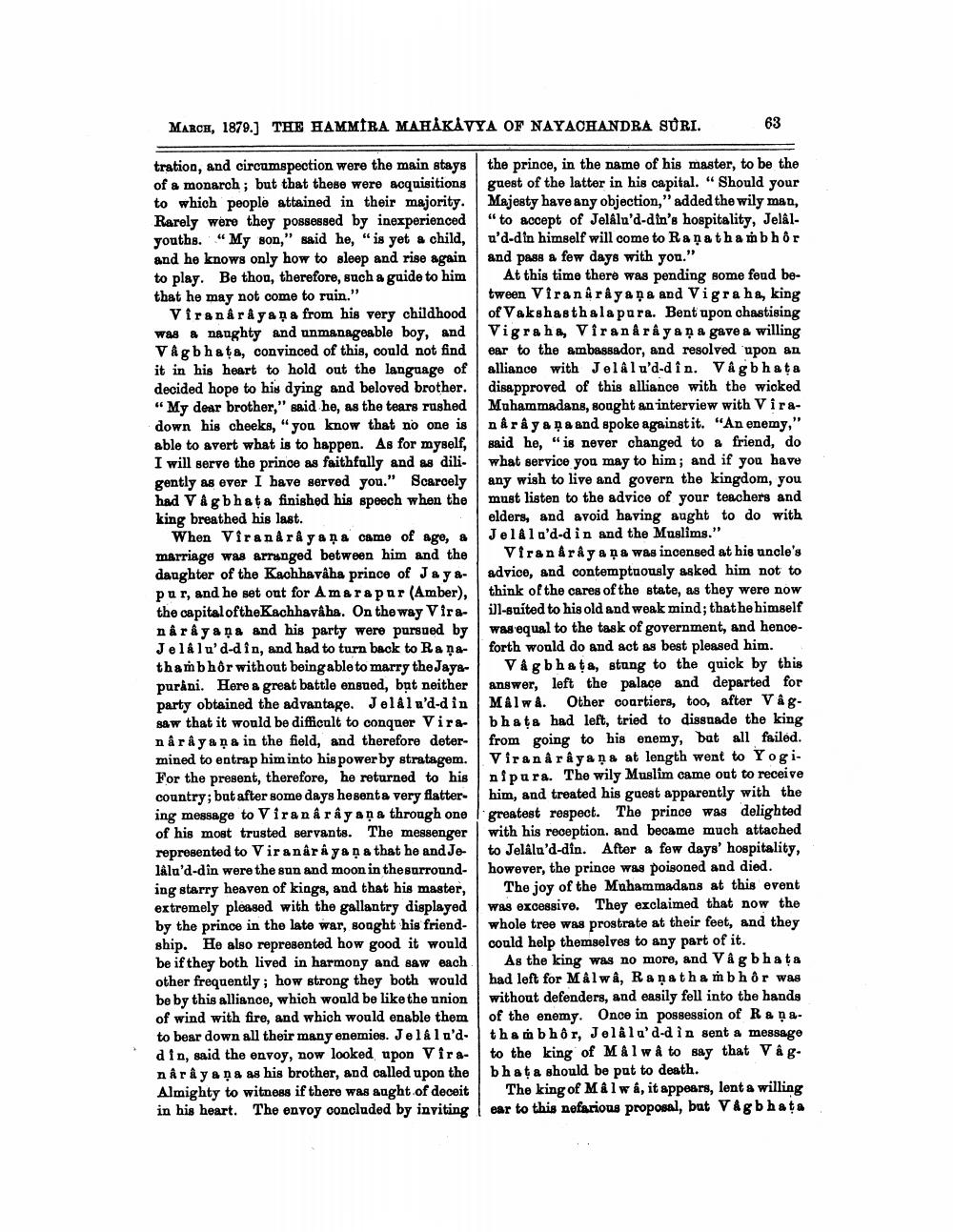________________
MARCH, 1879.] THE HAMMIRA MAHAKAVYA OF NAYACHANDRA SURI.
tration, and circumspection were the main stays of a monarch; but that these were acquisitions to which people attained in their majority. Rarely were they possessed by inexperienced youths. "My son," said he, "is yet a child, and he knows only how to sleep and rise again to play. Be thou, therefore, such a guide to him that he may not come to ruin."
Viranarayana from his very childhood was a naughty and unmanageable boy, and Vagbhata, convinced of this, could not find it in his heart to hold out the language of decided hope to his dying and beloved brother. "My dear brother," said he, as the tears rushed down his cheeks, "you know that no one is able to avert what is to happen. As for myself, I will serve the prince as faithfully and as diligently as ever I have served you." Scarcely had Vagbhata finished his speech when the king breathed his last.
When Viranarayana came of age, a marriage was arranged between him and the daughter of the Kachhavâha prince of Jayapur, and he set out for Amarapur (Amber), the capital ofthe Kachhavâha. On the way Viranarayana and his party were pursued by Jelâlu' d-din, and had to turn back to Ra nathambhor without being able to marry the Jayapurani. Here a great battle ensued, but neither party obtained the advantage. Jelâlu'd-din saw that it would be difficult to conquer Viranarayana in the field, and therefore determined to entrap him into his power by stratagem. For the present, therefore, he returned to his country; but after some days he sent a very flattering message to Viranarayana through one of his most trusted servants. The messenger represented to Viranarayana that he and Jelala'd-din were the sun and moon in the surrounding starry heaven of kings, and that his master, extremely pleased with the gallantry displayed by the prince in the late war, sought his friendship. He also represented how good it would be if they both lived in harmony and saw each. other frequently; how strong they both would be by this alliance, which would be like the union of wind with fire, and which would enable them to bear down all their many enemies. Jelâl u'ddin, said the envoy, now looked upon Viranarayana as his brother, and called upon the Almighty to witness if there was aught of deceit in his heart. The envoy concluded by inviting
63
the prince, in the name of his master, to be the guest of the latter in his capital. "Should your Majesty have any objection," added the wily man, "to accept of Jelâlu'd-din's hospitality, Jelâla'd-din himself will come to Rana thambhor and pass a few days with you."
At this time there was pending some feud between Viranarayana and Vigraha, king of Vakshasthalapura. Bent upon chastising Vigraha, Viranarayana gave a willing ear to the ambassador, and resolved upon an alliance with Jelâlu'd-din. Vâgbhata disapproved of this alliance with the wicked Muhammadans, sought an interview with Viranârâ yana and spoke against it. "An enemy," said he, "is never changed to a friend, do what service you may to him; and if you have any wish to live and govern the kingdom, you must listen to the advice of your teachers and elders, and avoid having aught to do with Jelala'd-din and the Muslims."
Viranarayana was incensed at his uncle's advice, and contemptuously asked him not to think of the cares of the state, as they were now ill-suited to his old and weak mind; that he himself was equal to the task of government, and henceforth would do and act as best pleased him.
Vågbhata, stung to the quick by this answer, left the palace and departed for Malwa. Other courtiers, too, after Vågbhata had left, tried to dissuade the king from going to his enemy, but all failed. Viranarayana at length went to Yoginipura. The wily Muslim came out to receive him, and treated his guest apparently with the greatest respect. The prince was delighted with his reception. and became much attached to Jelâla'd-din. After a few days' hospitality, however, the prince was poisoned and died.
The joy of the Muhammadans at this event was excessive. They exclaimed that now the whole tree was prostrate at their feet, and they could help themselves to any part of it.
As the king was no more, and Vågbhata had left for Målwâ, Ranathambhor was without defenders, and easily fell into the hands of the enemy. Once in possession of Ranathambhôr, Jelâla'd-din sent a message to the king of Malwâ to say that Vâ gbhata should be put to death.
The king of M & 1 w â, it appears, lent a willing ear to this nefarious proposal, but Vagbhata




